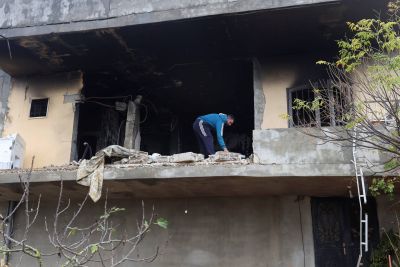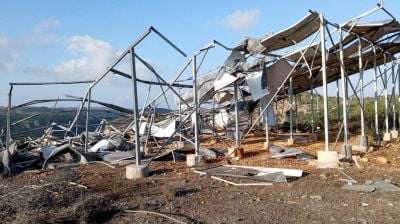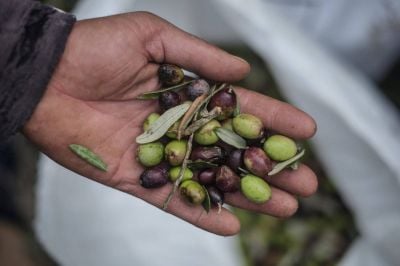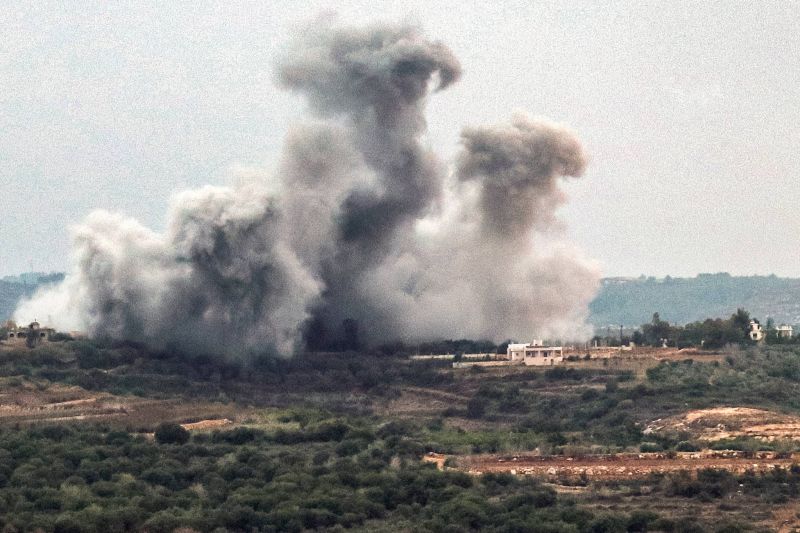
Smoke billows after Israeli bombardment on the outskirts of the village of Tayr Harfa close to the Israeli border in south Lebanon on Dec. 9, 2023. (Credit: AFP)
BEIRUT — Reddish worms wiggle through a scoop of wet soil in Hadi Awada’s hands. In the cell phone video, taken two months ago by the 24-year-old farmer and permaculture expert, shows the legless invertebrates munching on a watermelon rind.
This year marked the inception of Awada’s worm farm in Kfar Kila, a border town that has become the forefront of intense Israeli bombardment since October.
He had wanted to find a way to improve soil quality, grow healthier crops and help farmers in south Lebanon rely on less chemical fertilizers.
One way to do that was with worms. They break down organic waste — by simply eating or processing it and then pooping it out — creating nutrient-rich soil amendments, known as vermicompost or worm castings, which Awada intended to eventually distribute among small-scale farmers.
The serenity of Awada's worm-aided farming pursuits has been disrupted by the ongoing armed combat between Hezbollah and Israel, sparked after a massive Oct. 7 raid by Hamas against Israel, and Israel’s subsequent deadly retaliation on Gaza.
For 65 days, villages on the Lebanese-Israeli border have witnessed clashes between Hezbollah and Israel, killing more than 15 civilians in Lebanon and 98 fighters within Hezbollah and its allied militias. Nearly 60,000 people have also been displaced.
The fighting has also led to soil contamination in southern Lebanon, displaced farmers, disrupted supply chains, and destroyed infrastructure, undermining the principles of sustainability and ecological balance central to organic farming.
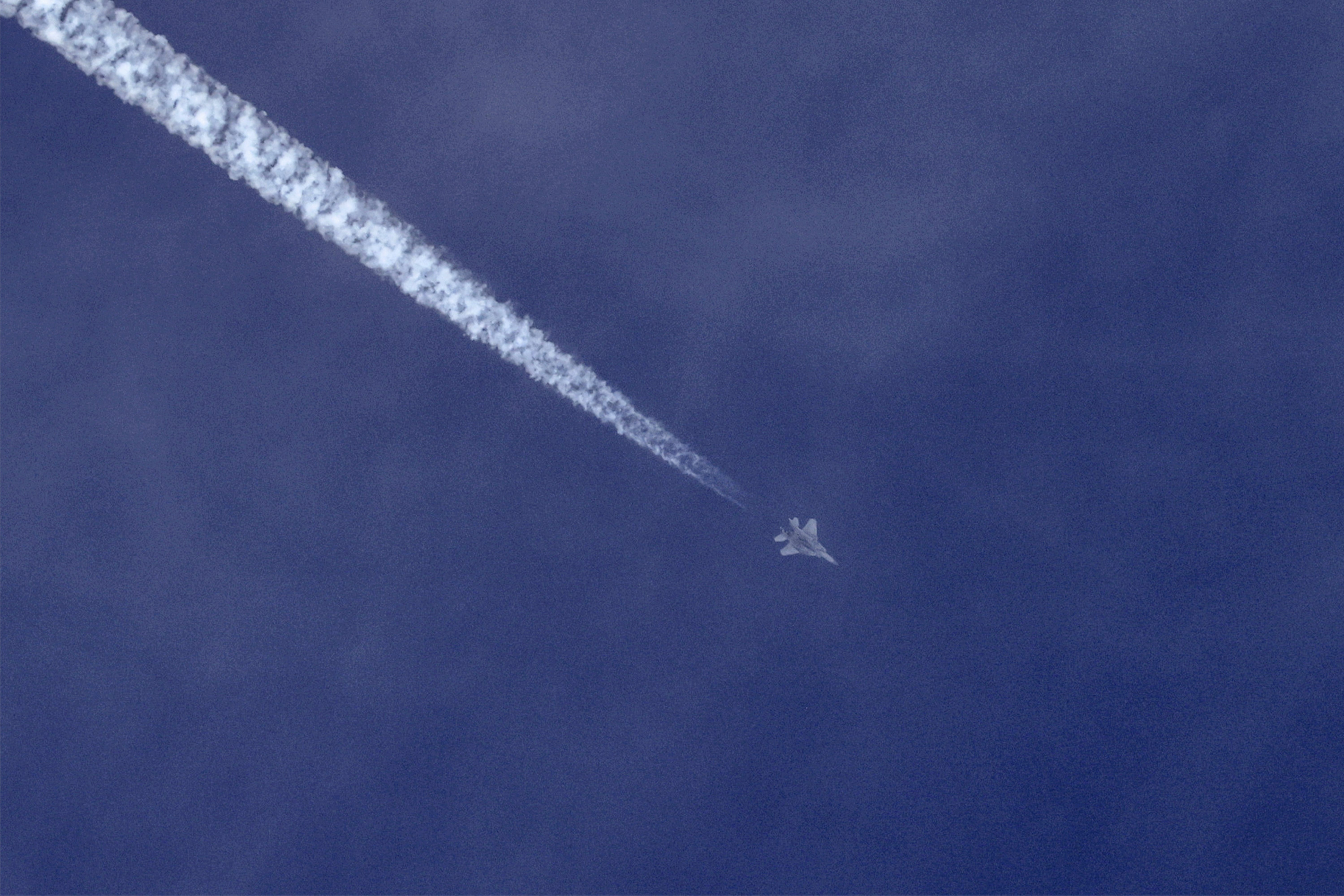 An Israeli air force fighter aircraft flies over the border area with Lebanon in northern Israel on Dec. 10, 2023. (Credit: Jalaa Marey/AFP)
An Israeli air force fighter aircraft flies over the border area with Lebanon in northern Israel on Dec. 10, 2023. (Credit: Jalaa Marey/AFP)
Awada’s initiative is not the first of its kind in Lebanon.
“There are approximately six worm farms, the oldest dating back to around 2016, and their scale being much bigger — with farms having more than five million earthworms,” Awada explained. His own farm had around 20,000 worms. “I’m not expanding on a much bigger scale—it's a way by which I can pave the way for these practices to start in the south, to be able to spread the knowledge about bio-amendments and have them ready for people who are interested in changing their [agricultural] methods.”
Some of the main challenges facing the agricultural sector in Lebanon include post-harvest practices, and soil degradation and pollution due to the overuse of agrochemicals.
“Using chemical soil fertilizers haphazardly often leads to leaching,” environmental scientist Moustapha Itani told L’Orient Today, explaining that the term refers to inorganic chemical elements, such as nitrates, draining away from soil and ending up in “nearby water bodies or groundwater.”
Excessive nitrate levels in lakes and ponds can harm ecosystems, prompt algal blooms and thus potentially kill fish.
Everything on hold
Initially, Awada stayed in Kfar Kila with his uncle to tend to his worm farm. As the conflict escalated, he fled to Beirut, seeking refuge with his father and brother.
To ensure his worm farm continued to receive daily care, Awada relocated his worms in plastic boxes to a friend's house in Broummana, more than 100 kilometers away from Kfar Kila.
“My friend is familiar with how to take care of them when I’m not checking up on them,” he said.
The move, however, incurred a significant loss. About one-third of his worms — red wigglers and tiger worms — perished, setting back Awada's plans to launch the worm-derived soil amendment in January.
Awada grew up in an agricultural household. He started testing his worm farm on his family-owned land, adorned by generational olive trees as well as 1,200 seedlings he had planted before the border fighting.
Those included 14 kinds of heirloom seeds: tomatoes, eggplants, watermelon, pumpkin and okra.
Awada had also begun a project to recycle wood chips, which farmers usually burn, into mulch using an “expensive” chipper shredder — one he had purchased the same week the fighting flared between Hezbollah and Israel.
“I got really screwed” with this project, which is now on hold, “because I have already invested in it and I was hoping it would start generating some money back.”
He had planned to use the shredded mulch to retain soil moisture, improve its fertility and block out weeds, instead of relying on chemical alternatives.
“Collecting carbon waste also helps with reducing the danger of forest fires,” Awada said.
Now, as he waits, like everyone else in Lebanon, to see how tense events in the south will unfold, Awada hopes to replenish the worm population and so he can use a grant he was selected for, months ago, that will provide equipment for a worm nursery.
Fields turned to frontlines
In the western part of south Lebanon, seasoned farmer Oudey Abou Sari had been using a unique drip irrigation system and chicken manure as a fertilizer.
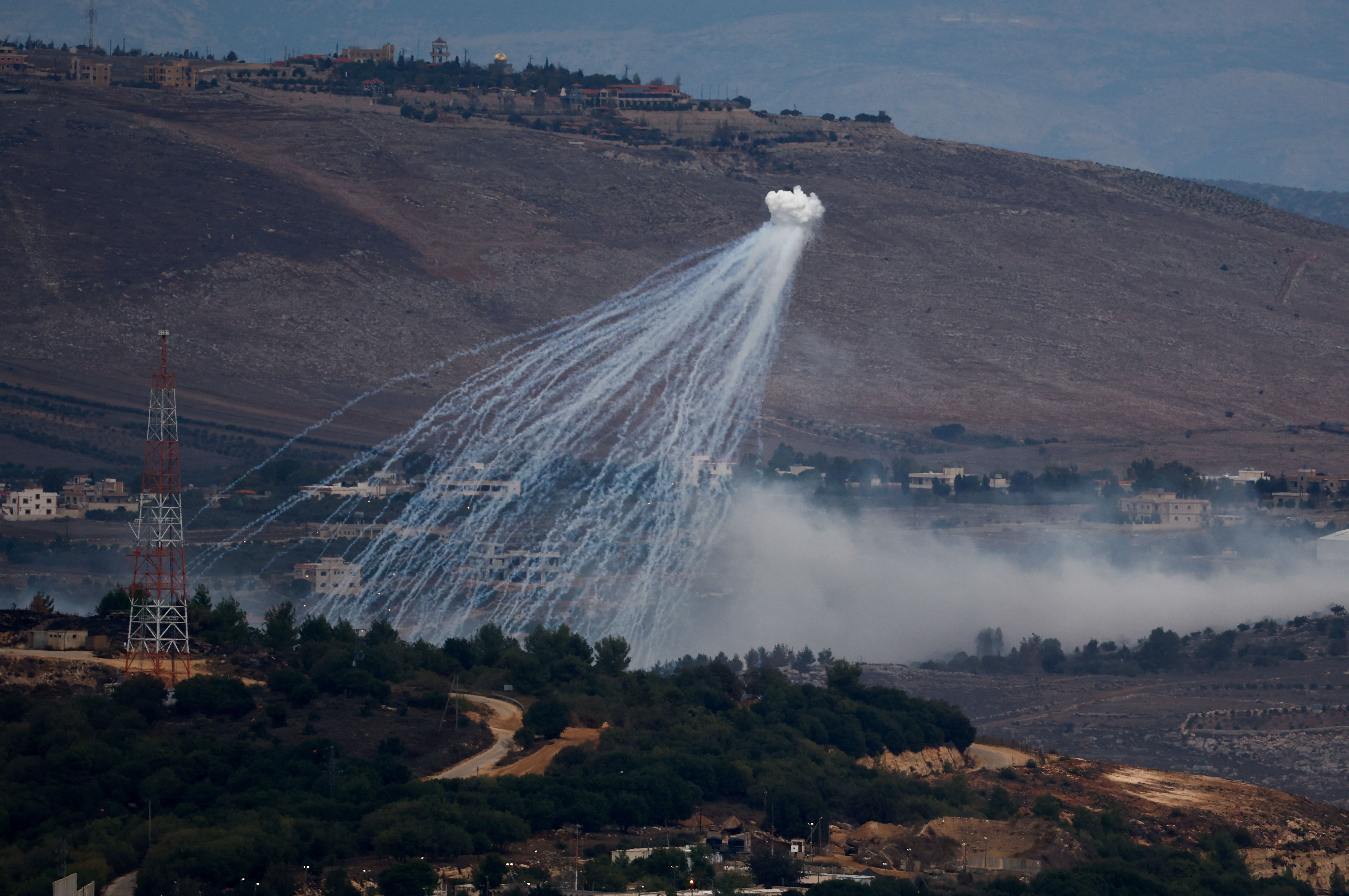 White phosphorus fired by the Israeli army, seen on the Israel-Lebanon border in northern Israel, Nov. 12, 2023. (Credit: Evelyn Hockstein/Reuters)
White phosphorus fired by the Israeli army, seen on the Israel-Lebanon border in northern Israel, Nov. 12, 2023. (Credit: Evelyn Hockstein/Reuters)
“Lebanon has an informal system for collecting animal manure and using it for farming,” the environmental scientist Itani told L’Orient Today. “It’s a source of organic fertilizer, in which most of the nutrients are in bigger compounds so they don’t leach as easily,” compared to chemical fertilizers.
Abou Sari has been cultivating his 5,500 square meters of family-inherited farmland in Dhayra, where he is from, for 13 years.
But Israel started bombing Dhayra on the second day of the Hamas-Israel war. L’Orient Today’s reporters visited this village in recent days, where they discovered serious damage caused by Israeli strikes, scorched olive trees, and walls marked with holes.
The destruction has been devastating to Abou Sari.
The 29-year-old farmer had earned the trust of other landowners, who granted him the use of their property for a fee — $100 for every 1,000 square meters of land per year.
The vegetable, wheat and tobacco farmlands span several villages, including Yarin, Alma al-Shaab and Tayr Harfa — all of which are perilously located just hundreds of meters away from the border.
“They all lie on the battlefield,” he lamented.
Abou Sari’s own farmland in Dhayra boasted a diverse array of crops, from cabbage and cauliflower to lettuce, broccoli, kidney beans, zucchini and more.
To gain an edge over other farmers, the farmer planted these crops before the border fighting started; two months ahead of the usual peak season of winter vegetables and pulses, when farmers could rely on rainwater to save money on irrigation costs.
Despite his foresight, Abou Sari’s entire farm, including 13,600 saplings, was exposed to Israeli-fired white phosphorus bombs — a devastating blow that meant all of his crops were contaminated.
“I raised my saplings just like a person raises his own son,” Abou Sari said.
There have been multiple reports by L'Orient-Le Jour, Amnesty International and Human Rights Watch accusing Israel of using internationally-banned white phosphorus in southern Lebanon.
“The phosphorus smoke was so dense,” Abou Sari, who says he witnessed the white phosphorus bombs fall in Dhayra, told L’Orient Today. “I can't sell people those vegetables at my own responsibility. Plant leaves and, eventually, roots were probably exposed to the phosphorus.”
“Even if I want to sell it, as soon as [the merchants] find out the crops are from Dhayra, no one will buy from me, because everyone knows that Dhayra was exposed to phosphorus,” he said.
Another obstacle to selling his produce lies in the fact that produce markets in Aita al-Shaab, an area that is continually exposed to Israeli shelling, were forced to shut down, Abou Sari pointed out.
The farmer’s financial loss came at “nothing less than $7,000,” including the damage incurred to his irrigation network, he said.
Abou Sari said no one came to inspect his farmland or promise him compensation, except for Hezbollah.
Hezbollah members had him fill out a form, Abou Sari says, “but the guy told me to write down nine square meters instead of my 5,500 in the section where they ask about the size of my land.”
“I don't have nine. I have 5,500,” he reiterated, disheartened.
Hezbollah announced last month it will compensate residents of southern border villages that have been “directly affected” by the recent fighting with Israel, with compensation for agricultural land damages to come later. Abou Sari says the Hezbollah members who had visited him were taking notes about his farm, as his house had not been damaged.
Despite the danger of war, he remains on his other, non-contaminated farmlands tending to his tobacco and wheat crops, whose peak season is now.
With a family of three to support, Abou Sari relies “entirely on agriculture for livelihood. I have no other income.”
“If I don't grow wheat and tobacco, my loss is at more than $25,000," he said. And with his vegetable fields now contaminated with white phosphorous, leaving the land unusable for now, the wheat and tobacco crops are his sole hope for making ends meet — if those fields don’t get bombed, too.
